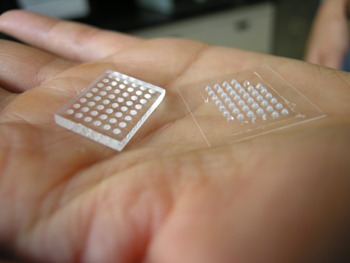A research team led by Linda Pilarski, who serves as Canada Research Chair in Biomedical Nanotechnology as well as an oncology professor at the University of Alberta, has developed a microfluidic chip that is capable of analyzing up to 80 various cancer genetic markers, paving the way to conduct low-cost and user-friendly diagnostic tests at remote locations.
 University of Alberta oncology professor Linda Pilarski, along with her research team, has created a microfluidic chip that can test for up to 80 different genetic markers of cancer. Courtesy: Dammika Manage.
University of Alberta oncology professor Linda Pilarski, along with her research team, has created a microfluidic chip that can test for up to 80 different genetic markers of cancer. Courtesy: Dammika Manage.
The microfludic chip comprises 80 tiny posts, each of which performs a different analysis for a specific mutation. According to Pilarski, clinicians can now carry out diagnosis within an hour using the microfludic chips when compared to existing larger devices, helping the patients to know their results quickly.
Although cancer is the core area of Pilarski’s research, her microfluic chips can also be utilized to perform diagnostic tests for several diseases. Aquila Diagnostics, a medical equipment firm, intends to use Pilarski’s technology for this purpose. With this technology, any infectious diseases from the dangerous West Nile virus to a mild flu can be easily diagnosed by clinicians.
This compact handheld microfluidic chip will be very helpful in regions that are largely affected by infectious diseases and where the number of health facilities is very low. Pilarski noticed that sub-Saharan Africa is one of such areas where around 11 million kids die annually due to diarrhea, malaria and pneumonia, which are easily curable. Pilarski anticipates that the chip will be ready for performing on-field tests by next year.